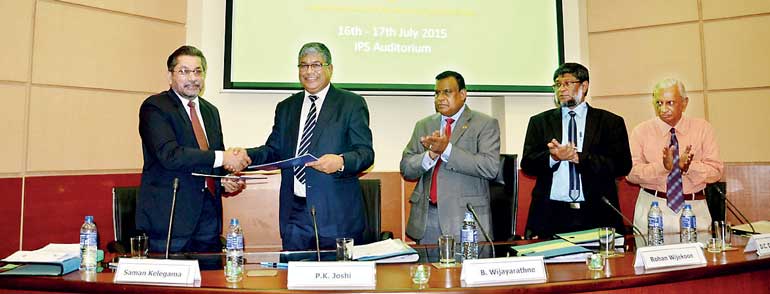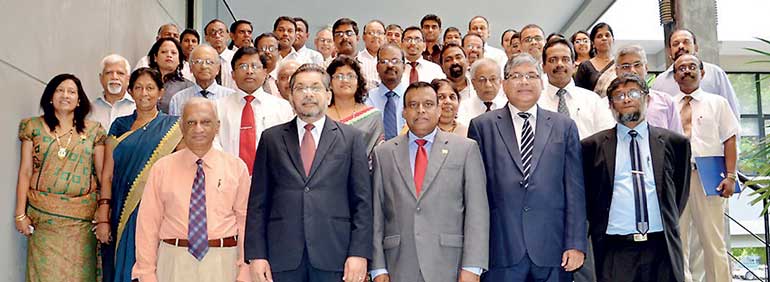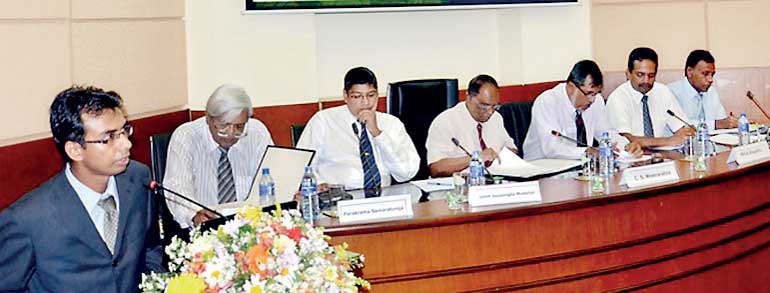Wednesday Feb 25, 2026
Wednesday Feb 25, 2026
Friday, 24 July 2015 00:29 - - {{hitsCtrl.values.hits}}

From left: IPS Executive Director Dr. Saman Kelegama and IFPRI-South Asia Director Dr. P.K Joshi during the singing of the MOU for a collaborative research on Food Security in South Asia at the IPS Auditorium as Ministry of Agriculture Secretary B. Wijayarathne (Guest of Honour), Department of Agriculture Director General Dr. Rohan Wijekoon (Chief Guest) and D.C. Dheerasekera, Consultant look on

Participants at the ‘National Consultation Workshop on Key Challenges and Opportunities for Food Security Policies’ held at the IPS Auditorium in Colombo

IPS Research Economist Dr. Manoj Thibbotuwawa commencing the first session on ‘Food Security Situation in Sri Lanka’
The Institute of Policy Studies of Sri Lanka (IPS) and the International Food Policy Research Institute (IFPRI) recently signed a Memorandum of Understanding (MOU) for a collaborative research on Food Security in South Asia to strengthen research and capacity building. The MoU also aims to facilitate effective management of agricultural resources, by government and poor rural communities in developing countries, and increase the impact of research.
The MoU was signed between IPS and IFPRI and Dr. Saman Kelegama, IPS Executive Director and Dr. P. K. Joshi, Director, IFPRI-South Asia signed on behalf of the respective institutions. The signing took place at the Inauguration of a two-day ‘National Consultation Workshop on Key Challenges and Opportunities for Food Security Policies’ held at the IPS Auditorium in Colombo.
The aim of the workshop organised by IPS and IFPRI was to identify key challenges and opportunities for food security in Sri Lanka and provide the basis for the formation of a successful food security policy framework for the country.
Addressing the gathering, Dr. Kelegama said: “Eliminating food insecurity will require a holistic approach that promotes sustainable agriculture while ensuring economic viability of farm operations and environmental sustainability. By working together and supporting sustainable agricultural development, I am confident that we can not only improve the food security of those who are hungry, but create new opportunities to mitigate the future vulnerabilities of the people for hunger.”
Commencing the first session of the national consultation workshop ‘Food Security in Sri Lanka’, IPS Research Economist, Dr. Manoj Thibbotuwawa highlighted the “importance of solving the food insecurity as a productive investment in human capital, rather than just a consumption or welfare measure”.
The workshop further discussed different avenues and best practices that ensure sustainable food production in Sri Lanka; identified most important interactions, synergies and trade-offs between climate change and food security; discussed the potential value and role of promoting healthy food systems in food security; dignified gaps in the regulatory framework that hinder the agri-food value chains; identified the role of value addition, agribusiness and market access.
At the end of the workshop participants synthesised the above objectives and suggested modalities for policy makers and other stakeholders to develop policies to promote food security in Sri Lanka. The final outcome of the workshop will be shared with policymakers and other stakeholders in the coming weeks in order to provide a platform for future food security policy strategies.
The workshop brought together professionals from agriculture, trade, health, finance, and nutrition sections from various ministries, universities, private sector, NGOs and civil society, to develop roadmaps for achieving the goal of food security who participated in an interactive and constructive discussion.